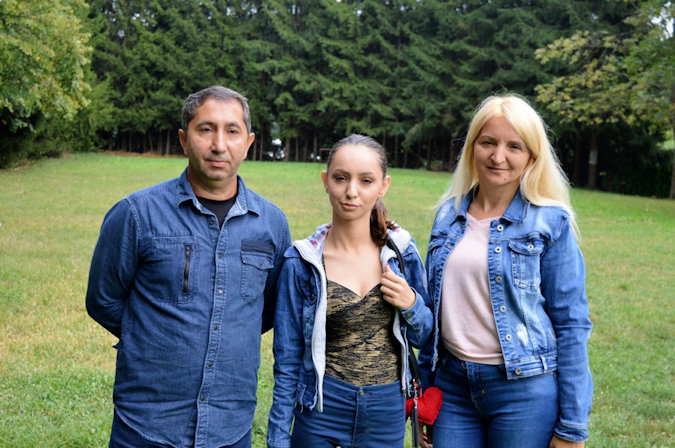Roma mediators build a bridge between the Roma community and public institutions in Bosnia and Herzegovina
Date:

In Bosnia and Herzegovina, a family of Roma activists help Roma community members in Prnjavor and surrounding municipalities in the north to become aware of their rights and access services from public institutions, including in cases of domestic violence.
For Mišo, Dajana, and Snježana Mirković, supporting the Roma community is not only their job, but an important part of their life.
Since 2010, the Mirković family has been working with Romani Ćej (Roma Girl), the only organization for women's rights in Prnjavor, a municipality in the north of Bosnia and Herzegovina. Snježana Mirković is president of the organization, and Mišo and Dajana Mirković are a pair of father-daughter Roma community mediators. In their day-to-day work, they communicate with Roma women and men to help them exercise their rights and gain access to social and health services in their community.
Association Romani Ćej is a partner organization of Association Bolja Budućnost, a Roma women’s organization and an implementing partner of the EU-UN Women regional programme on ending violence against women in the Western Balkans and Turkey, “Implementing Norms, Changing Minds,” funded by the European Union. Together, the two organizations work to build trust between local Roma communities and public institutions and to improve access to services for protection from domestic violence among marginalized groups of women in their communities, including Roma women.
For the last two years, Mišo and Dajana Mirković have traveled hundreds of kilometers daily in order to talk to Roma women and men and build a bridge between the Roma community and public institutions. They help with everything – from sewage issues, getting school accessories or home appliances, dealing with landslides, all the way to reporting and following up on cases of domestic violence.
Because of their vulnerable position, Roma women and men in Bosnia and Herzegovina often don't have equal access to services and information, which makes the work of Mirković family that much more significant. “We follow the cases from beginning to end, and the community trusts us. We visit the communities, look into the issues, and then work further with individuals and institutions. When one person learns how things should be done, the knowledge is transferred further,” says Mišo Mirković.
Snježana Mirković explains that the organization was created with the goal to help Roma women become aware of their rights. “We started doing workshops on the prevention of violence and human trafficking, and slowly began to gain the trust of other citizens in our municipality. Women started coming to us to report violence, and we took it upon ourselves to contact the institutions in order to follow up on the cases,” she says. Apart from working with the Roma population, the association also works with members of other marginalized groups, such as women who have four or more children, rural women, and refugees.
A special part of their work entails working with women who are survivors of domestic violence. The biggest obstacle Roma women face in reporting violence is the fear that the police and responsible institutions won't protect them, and that the perpetrators will take away their children. “Unfortunately, stigma, discrimination and refusing to help Roma women is still present, even though people deny it,” says Dajana Mirković.
“Roma women have more difficulties in getting institutional help, and this is where we jump in – to help them be aware of their rights, in order for them to know that they don't have to stay with the perpetrators of violence,” explains Mišo Mirković.
Dajana Mirković describes her job as a mediator in simple words: “We are here for anything they need. If someone calls us in the middle of the night, we get up and go to the field. Whatever the problem is, we try to offer our support, whether it's violence, discrimination, financial aid or something else.”
“Not a single person that comes to us will be refused support,” says Snježana Mirković. Every year, the association also takes Roma women from Prnjavor and nearby municipalities – Vukosavlje, Doboj, Stanari – to gynecological examinations and pap smears, and they recently started taking Roma men to receive preventative health care against colon cancer.
The positive impact of their work is clear. “A lot of things are changing – people are transforming their opinions and attitudes,” says Mišo Mirković. “Awareness is being raised, and women have realized their worth, that they have rights, that they are protected and that there are people they can talk to,” he adds.